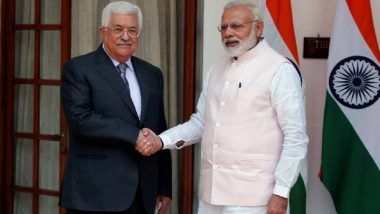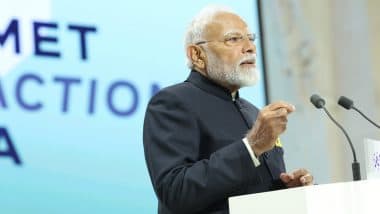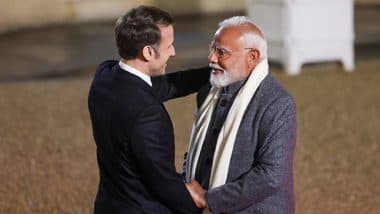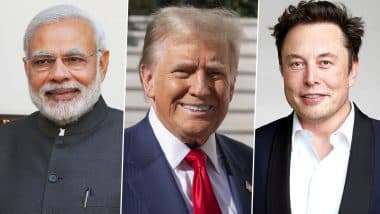Ramallah, February 10: Prime Minister Narendra Modi arrived in Ramallah on a historic visit to Palestine during which he will meet President Mahmoud Abbas and reaffirm India's support for the Palestinian people. Modi, the first Indian prime minister to visit Ramallah, arrived here on the first leg of his three-nation tour.
Prime Minister Modi and President Abbas will discuss ways to enhance bilateral relations as well as discuss the regional and international situations of common concern. "We will discuss the recent updates with Prime Minister Modi, and the recent developments in the peace process, the bilateral relations, and the regional situations. And the possible role India can play in enhancing peace in the region, as well as discussing different economical aspects beyond the existing ties we already possess," Abbas had told PTI.
Describing India as a "very respected country in the international arena", the 82-year-old Palestinian President had said that India can have a possible role in creating a multilateral forum of negotiations between the Palestinians and Israelis to reach a final agreement. According to Abbas, Modi's visit to the region reflects India's long-held position of supporting peace and stability in the region.
Prime Minister Modi will begin his engagement by laying a wreath at the Mausoleum of iconic Palestinian leader Yasser Arafat. He will be accompanied by his Palestinian counterpart Rami Hamdallah. After paying homage to Arafat, the prime minister will take a short tour accompanied by Hamdallah of the Yasser Arafat Museum located adjacent to the Mausoleum. Modi will then be received by President Abbas before the ceremonial welcome at the Muqata'a. The two leaders will then have discussions, sign bilateral agreements, hold a joint press conference and share lunch before Modi leaves for Amman in a chopper. During his maiden visit to Israel last year, Modi did not travel to Ramallah, the Palestinian seat of government. His standalone visit to Israel had led to many analysts questioning the future of the Indo-Palestine ties.
This time Modi skipped Israel in a clear message that India is de-hyphenating its ties with Israel and Palestine. Modi's visit to Palestine comes amid heightened tensions in the region after US President Donald Trump recognised Jerusalem as the capital of Israel. The unilateral US decision to declare Jerusalem as the capital of Israel was challenged at the UN General Assembly where 128 nations, including India, voted to turn down the move as "null and void". Trump's decision to declare Jerusalem as Israel's capital angered the Palestinians, sparked protests in the Middle East and raised concern that it could further destabilise the region.
Though India has shied away from becoming a party in the Israel-Palestinian conflict, the Palestinian leader on several occasions has stressed on a possible role for New Delhi in the Middle East peace process. India believes in a two-state solution in which both Israel and a future Palestinian state coexist peacefully. The two-state solution envisions independent Israeli and Palestinian states coexisting side by side peacefully. The Palestinians see east Jerusalem as their future capital.













 Quickly
Quickly





















